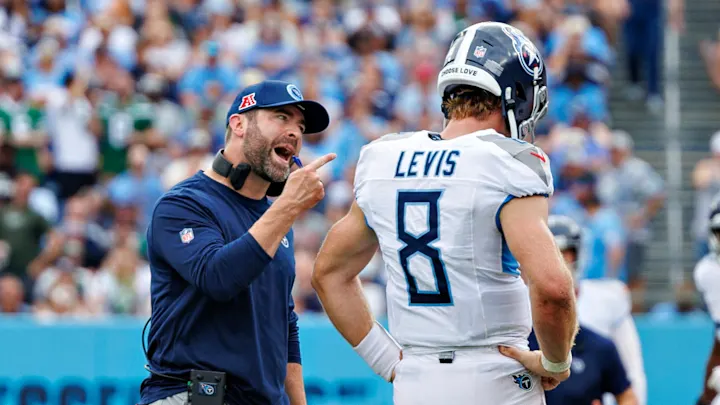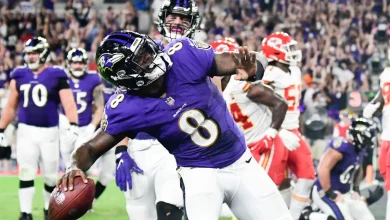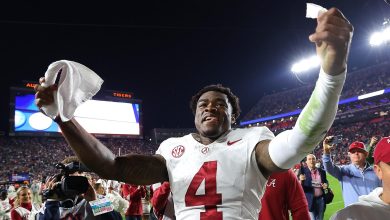Titans’ Brian Callahan defies Joe Burrow blueprint, betting on Miami Hurricanes legend Cam Ward after Will Levis’ flop.

The Tennessee Titans find themselves at a pivotal crossroads in their quarterback development and offensive identity. After the recent flop of quarterback Will Levis, offensive coordinator Brian Callahan is making a bold shift away from the previous Joe Burrow-inspired blueprint and placing his trust in Miami Hurricanes legend Cam Ward. This strategic move signals a new era for the Titans’ offense, as Callahan aims to harness Ward’s unique skill set to reshape the team’s offensive dynamics.
This article dives into the context behind this decision, contrasting the Burrow blueprint with Ward’s profile, analyzing Levis’ struggles, and projecting what this means for the Titans moving forward.
The Joe Burrow Blueprint: What Tennessee Tried and Why It Didn’t Work
To understand Brian Callahan’s current pivot, it’s essential to first examine the “Joe Burrow blueprint” that influenced the Titans’ recent offensive approach.
What Is the Joe Burrow Blueprint?
Joe Burrow, the Cincinnati Bengals’ star quarterback, has become a model for developing young QBs who combine pocket passing accuracy, quick decision-making, and leadership. Burrow’s approach is defined by:
- Precision Passing: Burrow is known for his accuracy and timing on intermediate and deep routes.
- Poise Under Pressure: Despite his relatively slight frame, he excels at navigating blitzes and making clutch throws.
- Offensive Rhythm: The Bengals’ offense emphasizes quick reads, timing-based routes, and spreading the field with versatile weapons.
- Leadership: Burrow commands the locker room and elevates teammates through his work ethic and calm demeanor.
Tennessee’s Adoption of the Burrow Blueprint
The Titans, under Brian Callahan’s guidance, tried to mold Will Levis into a Burrow-type quarterback, hoping to replicate Cincinnati’s success. They focused on improving Levis’ accuracy, decision-making, and timing, integrating quick-release concepts and pre-snap motions.
However, the blueprint was only partially successful.
Will Levis’ Flop: The Setback That Forced Change
Will Levis entered the Titans with high expectations as a talented quarterback with a strong arm and physical traits. But his performance fell short in key areas:
- Inconsistent Accuracy: Levis struggled with accuracy on intermediate and deep throws, limiting offensive explosiveness.
- Poor Decision-Making: Several costly turnovers and poor reads disrupted drives and stalled momentum.
- Adjustment Difficulties: He appeared uncomfortable adapting to the timing and rhythm required by the Burrow-inspired offense.
- Pressure Handling: Levis often struggled under pressure, missing open receivers or scrambling ineffectively.
The result was a disappointing stint that left the Titans searching for alternatives.
Enter Cam Ward: Miami Hurricanes Legend and the New Hope
Brian Callahan’s shift toward Miami Hurricanes legend Cam Ward represents a fresh approach to quarterback play in Tennessee.
Who is Cam Ward?
Cam Ward was a standout quarterback at the University of Miami, known for his athleticism, dual-threat capabilities, and leadership. His profile contrasts with the traditional pocket passer like Burrow:
- Athleticism: Ward can extend plays with his legs, making him a threat outside the pocket.
- Playmaking Ability: He excels at improvising when plays break down.
- Strong Arm: Ward possesses a powerful throwing arm capable of making all the necessary throws.
- Leadership: Like Burrow, Ward has been praised for his poise and leadership on and off the field.
Why Ward Fits the Titans’ New Direction
The Titans offense, historically grounded in physicality and run-first mentality, aligns well with a quarterback like Ward who can blend passing and rushing threats. Callahan sees Ward as a player who can:
- Create Plays on the Move: Ward’s mobility opens up the offense, forcing defenses to account for both pass and run threats.
- Leverage Titan’s Strengths: Tennessee’s strong offensive line and running backs can complement Ward’s ability to extend plays.
- Simplify the Scheme: Moving away from complex timing routes to a more adaptable offense suits Ward’s improvisational style.
- Energize the Locker Room: Ward’s leadership qualities could stabilize a team in transition.
Breaking from Tradition: The Implications of Callahan’s Move
Brian Callahan’s decision to deviate from the Joe Burrow blueprint and bet on Cam Ward reflects a significant philosophical shift in the Titans’ offensive strategy.
Tactical Evolution
- From Timing to Playmaking: The offense will rely more on Ward’s improvisation and ability to escape pressure rather than strict timing routes.
- Increased Use of Rollouts and Bootlegs: To capitalize on Ward’s mobility and arm strength.
- More Designed QB Runs and Read-Options: Adding unpredictability and pressure on defenses.
- Adapted Play-Calling: More aggressive, taking shots downfield when Ward extends plays.
Cultural Shift
- Confidence in a Dual-Threat QB: Tennessee embraces a quarterback identity that blends passing and rushing.
- New Leadership Dynamic: Ward’s leadership style may galvanize teammates, especially after Levis’ struggles.
- Player-Centric Approach: Callahan’s willingness to tailor the offense to Ward’s strengths marks a move away from rigid schemes.
Potential Challenges and Risks
While the move to Cam Ward offers exciting possibilities, there are inherent risks:
- Learning Curve: Ward must adjust to NFL speed and complexities, especially within a new system.
- Injury Risk: Dual-threat quarterbacks face higher injury risk due to increased rushing attempts.
- Offensive Line Pressure: The Titans must protect Ward to maximize his effectiveness.
- Consistency: Ward needs to demonstrate consistent accuracy and decision-making to sustain success.
What This Means for the Titans’ Future
Brian Callahan’s gamble on Cam Ward could redefine the Titans’ offense and broader team identity.
- Potential Playoff Push: If Ward thrives, the Titans could regain their competitive edge in the AFC South and beyond.
- Recruiting and Development: Success with Ward may attract other versatile athletes to Tennessee’s program.
- Fan Engagement: The excitement generated by Ward’s dynamic playmaking could rejuvenate the fan base.
The Tennessee Titans’ offensive coordinator Brian Callahan’s decision to go against the Joe Burrow blueprint and bet on Miami Hurricanes legend Cam Ward marks a bold and refreshing new chapter. After Will Levis’ disappointing performance, the Titans are embracing a different style of quarterback play — one rooted in athleticism, improvisation, and dual-threat capability.
This strategic pivot not only addresses immediate needs but could also shape the Titans’ identity for years to come. While challenges remain, Callahan’s confidence in Ward signals a commitment to innovation, adaptability, and bold decision-making.
As the 2025 season unfolds, all eyes will be on Cam Ward and the Titans’ offense to see if this gamble pays off — potentially altering the course of the franchise and the dynamics of the AFC.









